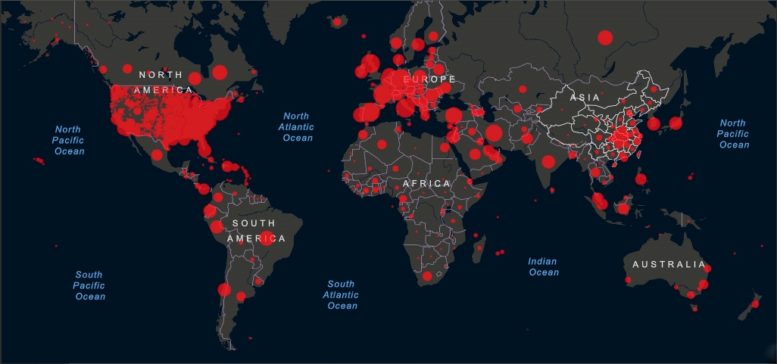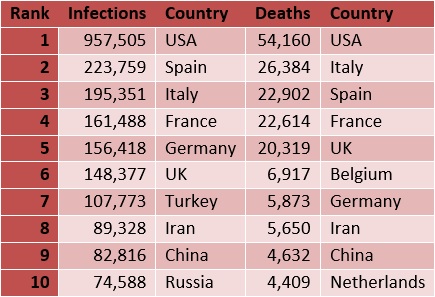The Novel Coronavirus (CoVID-19) infection was first reported on 31-Dec-2019. The virus originated from Wuhan, China and quickly spread to coastal cities, and internationally. The South China Agricultural University reports their discovery of a 99% genetic match between CoVID-19 and a strain of the virus in pangolins. An earlier study published in Nature finds the probable origin of the virus with a 96% genetic match in Rhinolophus bats. The latest genome analysis on the CoVID-19 origins suggests the two viruses combined in civets as the intermediary host of the merged virus that is able to infect humans. China has now finally banned wild animals as food. On 30-Jan-2020, the WHO declared the CoVID-19 virus a “Public Health Emergency of International Concern.”
As of 25-April-2020, 2,846,576 cases were reported, a 350-fold increase over 8,096 cases reported on 30-Jan-2020. It has now affected 210 countries; caused 197,859 deaths; despite 811,778 recoveries. As a percentage of total, 28% recovered; 65% are ill (of which 97% are mild; and 3% are serious or critically ill); and 7% died.
Port Safety
Some international shipping ports have imposed quarantine on vessels and crew arriving from countries with virus cases. A risk of quarantine may lead to reluctance by ship-owners to call at agreed ports where an agreed port call may lead to quarantine elsewhere, and where an agreed port has quarantined vessels. Owners should quarantine infected crewmembers until they recover, before repatriating.
Force Majeure and Off-Hire
Affected parties may increasingly invoke the “force majeure” (FM) provision as shield from legal damages to businesses affected by CoVID-19. An outbreak that escalates with direct implications on a business operation like shut downs and delays could fall within the scope of an FM clause. Review FM provisions ensuring all requirements are complied with, with supporting documentary evidence. CoVID-19 may hobble facilities in the whole supply chain, so prepare contingency mitigation plans. A vessel is considered off-hire for fire, “deficiency of men,” breakdowns, damage, dry-docking, or “any other cause preventing the full working of the vessel.” Thus, a delayed ship due to quarantine restrictions may be considered off-hire.
Floating Quarantine
Manufacturing shutdowns mean ships have no reason to call at ports. Shut downs may lead to lay-offs and bankruptcies. Some ships are stuck in docks waiting for quarantined workers to return. There are vessels marooned at sea as “floating quarantined zones” as some countries refuse ships from Chinese ports unless quarantined.
Air Transport
Up until the fourth week of February, the WHO still neither recommended travel nor trade restrictions despite raising the risk level to “very high at a global level,” but some countries had already taken steps to implement ‘No Travel’ policies in light of the quickly spreading virus. Singapore and U.S. closed their borders to all who were in China during the Lunar New Year holidays, and Vietnam suspended new tourist visas to them. British Airways and Air New Zealand suspended direct flights to/from China. Hong Kong and Mongolia slashed cross-border travel with China. Russia stepped up travel restrictions. Australia activated its pandemic emergency plan, and banned flights to/from Iran. The U.S. banned flights to/from Italy and South Korea, while Azerbaijan and UAE closed borders with Iran. Denmark and Canada closed its borders to foreigners. Libya closed its air and ship ports. Global tourism is visually absent in cities that were once vibrant, but now ghostly. Six months straight of travel bans may force some airline companies to file for bankruptcy in order to restructure their debts.
Sea Transport
Idle container fleets are on record highs. Big shippers reduced the number of vessels on routes connecting China and HK with India, Canada, U.S. and West Africa. Carriers face difficulty in balancing container capacity and falling demand, as China’s export volume plunged. The unprecedented scale of disruption forced carriers to blank 46% of capacity in the Asia-Europe trade, Alphaliner reports. The container, dry cargo, and cruise industries are severely hit. The oil tanker industry will float in the near term, but driven by supply of cheaper oil, not demand.
Trade
Markets are ravaged, too volatile to buy in bulk, awash with negatives in many stocks, and falling future commodities. The lack or absence of demand is reflected in oil prices, which crashed into a bear market. BIMCO reported almost no demand from China for seaborne commodities like coal, crude oil and iron ore despite a high need for these in China and Japan. Malaysia’s iron ore Vale may close shop. Coal financing may be phased-out. But low oil prices reduce shipping costs.
Conclusion
These disruptions have significantly affected trade and transport resulting in a global supply chain crisis. OECD reports the global economy will suffer for years to come, due to no growth or negative growth in many economies, with the biggest economies falling into recession. CoVID-19 serves as a reminder on the high risk of major single-country dealings for imports or exports. Getting the world back to business-as-usual may take longer. On 11-March, WHO finally declared CoVID-19 a Pandemic when infections reached almost 120,000 people, killed over 4,000, and affected 115 countries with the risk of further global spread. On 16-March, all of Luzon was put on lock-down. Panic buying ensued. In January-February, the Philippines had only 3 cases, and 1 death. By 25-March, the infections had risen to 636 cases, and 38 deaths. By 25-April, the infections had jumped to 7,294 cases, and 494 deaths. The lock-down will likely be extended beyond May. The words “safe harbor” now carry a deeper meaning. A vaccine must be created quickly to eliminate this deadly virus for all of humanity to be safe again.

